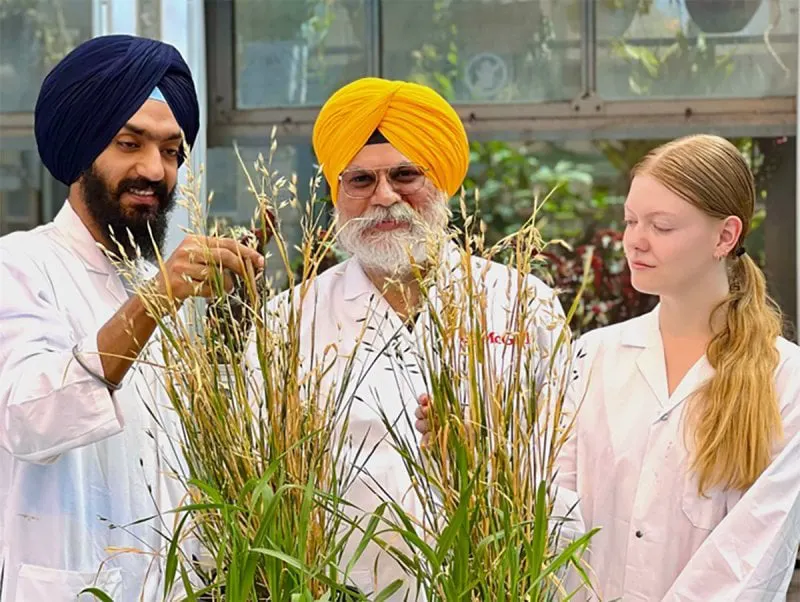The latest gene edited crop: Oats with higher yields, more fiber and climate change resilient
The latest gene edited crop: Oats with higher yields, more fiber and climate change resilient


For the first time, scientists have successfully edited oat DNA, a breakthrough that could accelerate the development of oats with more fibre, higher yields, and greater resilience to climate change.
Oats, a key crop both for human consumption and animal feed, are a major agricultural product in Canada, contributing to a global market work $8 billion. The Canadian oat crop is estimated to be worth approximately $900 million. But a short growing season and unpredictable late-season frost mean Canadian oat farmers face significant challenges.
In a study published in Plant Biotechnology Journal, researchers from McGill University outline how they used CRISPR-Cas9 gene-editing technology, a tool that works like genetic scissors, on oats for the first time. They say this technique, which involves “cutting out” and tweaking parts of genes, allowing precise genetic modifications, could lead to faster, more efficient improvements to oats than can be gained from traditional breeding and help farmers better cope with climate-related challenges.
The technology was not previously used on oat crops due to their complex genome and because earlier gene-editing methods were not thought to be effective.
“Using CRISPR-Cas9, we were able to make very specific genetic changes in oats that would traditionally take years to achieve through conventional breeding,” said study leader Jaswinder Singh, a Professor in the Department of Plant Sciences. “Our method not only speeds up the breeding process but also allows us to avoid introducing foreign DNA into the plants, making them safer and more acceptable to consumers.”
Faster, smarter breeding
The researchers focused on genes related to such key oat traits as panicle development (the arrangement of seed heads), plant maturity and beta-glucan content, which is known for its health benefits. The team used a method called biolistic delivery (gene gun) to introduce the CRISPR-Cas9 components into oat cells. This led to changes in the plants that could have significant real-world benefits.
Among the most exciting results was the creation of a new vegetative phenotype: The plants grew differently, with the potential to produce higher yields of forage, or food for animals.
The researchers also identified oat plants with altered flowering times, suggesting the possibility that oat varieties could be bred to mature either earlier or later, depending on the needs of the farmer and the local climate.
“This breakthrough is incredibly important for climate adaptation,” said Mehtab Singh, PhD student and lead author of the paper. “By developing oats that mature earlier or can handle colder conditions, we’re helping farmers in regions with short growing seasons or unpredictable weather patterns grow more reliable and sustainable crops.”
The researchers say faster-maturing oats could one day help reduce the need for chemicals used to speed up harvests, addressing concerns about residues and environmental impacts.
Next, the researchers plan to further explore other traits, such as disease resistance and stress tolerance, and to test the gene-edited oats in field conditions.
About the study
A highly efficient CRISPR-Cas9-based gene editing system in oat (Avena sativa L.) by Mehtab-Singh, Cali Kaye, Rajvinder Kaur, and Jaswinder Singh was published in Plant Biotechnology Journal.
This study was financially supported by the Prairie Oat Growers Association (POGA) through the Agriculture Funding Consortium. We also acknowledge the support of the NSERC-CREATE program on Genome Editing for Food Security and Environmental Sustainability (GEFSES).

 | Videos | More... |

Video: Nuclear energy will destroy us? Global warming is an existential threat? Chemicals are massacring bees? Donate to the Green Industrial Complex!
 | Bees & Pollinators | More... |

GLP podcast: Science journalism is a mess. Here’s how to fix it

Mosquito massacre: Can we safely tackle malaria with a CRISPR gene drive?

Are we facing an ‘Insect Apocalypse’ caused by ‘intensive, industrial’ farming and agricultural chemicals? The media say yes; Science says ‘no’
 | Infographics | More... |

Infographic: Global regulatory and health research agencies on whether glyphosate causes cancer
 | GMO FAQs | More... |

Why is there controversy over GMO foods but not GMO drugs?

How are GMOs labeled around the world?

How does genetic engineering differ from conventional breeding?
 | GLP Profiles | More... |

Alex Jones: Right-wing conspiracy theorist stokes fear of GMOs, pesticides to sell ‘health supplements’




 A single high dose of LSD can ease anxiety and depression for months
A single high dose of LSD can ease anxiety and depression for months CRISPR pork: U.S. approves first gene-edited pigs for consumption
CRISPR pork: U.S. approves first gene-edited pigs for consumption From plastic coasters to human hearts: Inside the race to print the human body
From plastic coasters to human hearts: Inside the race to print the human body ‘SuperAgers’: Why some people have the brains and memory capacity of people decades younger
‘SuperAgers’: Why some people have the brains and memory capacity of people decades younger  Baby food panic, brought to you by trial lawyers hoping to prosecute by press release
Baby food panic, brought to you by trial lawyers hoping to prosecute by press release From ‘Frankenfood’ to superfood: Can the purple tomato overcome GMO myths to win over consumers?
From ‘Frankenfood’ to superfood: Can the purple tomato overcome GMO myths to win over consumers? Viewpoint: Life and death decisions: RFK, Jr.’s shady FDA “expert panels” operate in secret with no transcripts or conflict of interest reviews
Viewpoint: Life and death decisions: RFK, Jr.’s shady FDA “expert panels” operate in secret with no transcripts or conflict of interest reviews When farmers deny science: The hypocrisy hurting agriculture’s credibility
When farmers deny science: The hypocrisy hurting agriculture’s credibility
